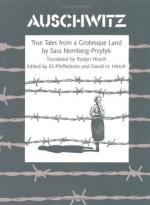|
This section contains 261 words (approx. 1 page at 400 words per page) |

|
Editors' Afterword Summary and Analysis
The editor claims that the Holocaust not only raised questions for Western civilization as a whole but also represented a major test of Jewish tradition and the Jewish people. A number of Jews have struggled with the history of the Holocaust, such as Elie Wiesel. Holocaust witnesses had a great troubled telling the story as it "happened" without the distortions inevitably caused by psychological trauma. Concentration camp prisoners were brutally denied the ability to organize their lives and so had no appropriate psychological props, relying instead on the imaginative and threatening credibility as a result.
Like the other survivors, Sara decided to draw on her disturbing memories to try and make the reality of Auschwitz believable. However, she displays a particular interest in characters as methods of expressing the death-camp reality. All are embedded in the description of Holocaust...
(read more from the Editors' Afterword Summary)
|
This section contains 261 words (approx. 1 page at 400 words per page) |

|




